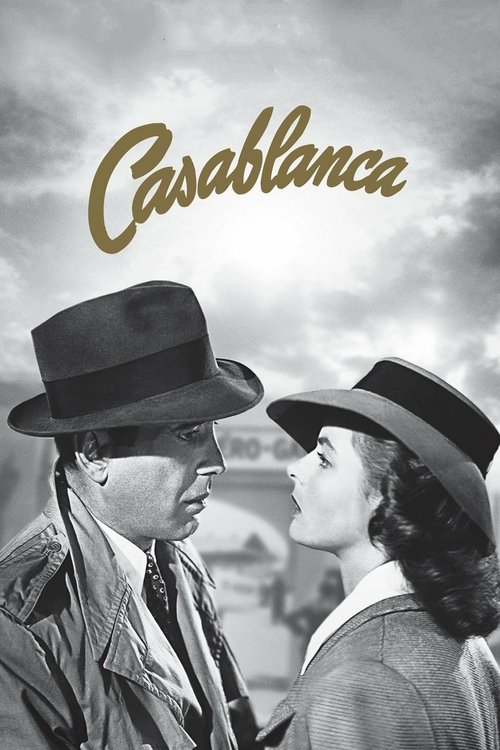A Timeless Tale of Love, Sacrifice, and Political Intrigue in the Heart of Morocco
/10
Posted on June 6, 2025
Casablanca, directed by Michael Curtiz, stands as a cinematic classic that continues to captivate audiences with its blend of romance, suspense, and moral complexity. Set against the backdrop of World War II, the film weaves a tale of love, sacrifice, and political intrigue in the exotic and tumultuous city of Casablanca. With iconic performances by Humphrey Bogart and Ingrid Bergman, the film remains a testament to the enduring power of storytelling and the human spirit in times of crisis and uncertainty.
Curtiz’s direction is a masterful exercise in pacing, mood, and tension, as he skillfully navigates the film’s shifting tones and themes with a deft hand. From the smoky interiors of Rick’s Cafe to the bustling streets of Casablanca, Curtiz creates a vivid and immersive world that transports viewers to a time and place of danger, intrigue, and forbidden love. The film’s evocative use of shadow and light, coupled with its striking compositions and dynamic camera work, imbues each scene with a sense of urgency and emotional depth that resonates long after the credits roll.
The screenplay, penned by Julius J. Epstein, Philip G. Epstein, and Howard Koch, is a work of narrative elegance and emotional resonance that has stood the test of time. The central love triangle between Rick, Ilsa, and Victor serves as a poignant allegory for the complexities of loyalty, sacrifice, and the moral dilemmas faced by individuals caught in the throes of war and political upheaval. The film’s iconic dialogue, including memorable lines like Here’s looking at you, kid and We’ll always have Paris, has become ingrained in the cultural lexicon, embodying the film’s themes of lost love, redemption, and the enduring power of memory and regret.
Bogart’s performance as Rick Blaine is a tour de force of charisma, vulnerability, and moral ambiguity, as he navigates the treacherous waters of love and duty with a world-weary charm and stoic resolve. Bergman’s portrayal of Ilsa Lund is equally compelling, capturing the character’s inner turmoil and conflicted loyalties with a grace and emotional depth that adds layers of complexity to the film’s central romance. The chemistry between Bogart and Bergman is palpable, infusing their scenes together with a sense of longing, regret, and unfulfilled desire that resonates with audiences on a deeply emotional level.
The film’s cinematography, overseen by Arthur Edeson, is a visual feast of atmospheric lighting, expressive framing, and evocative compositions that enhance the film’s mood and emotional resonance. Edeson’s use of deep focus, chiaroscuro lighting, and expressive camera movements creates a sense of intimacy and grandeur that mirrors the emotional stakes and moral dilemmas faced by the characters. The film’s iconic shots of the foggy airport runway, the bustling marketplaces of Casablanca, and the smoky interiors of Rick’s Cafe serve as a backdrop for the characters’ emotional journeys and narrative twists, highlighting the film’s exploration of love, sacrifice, and the redemptive power of selflessness.
While Casablanca is hailed as a timeless classic of Hollywood cinema, it is not without its flaws. Some critics have pointed out the film’s romanticized portrayal of wartime politics and its simplification of complex historical events as potential sources of historical inaccuracy and narrative oversimplification. The film’s treatment of its supporting characters, particularly those of non-Western descent, may be seen as stereotypical or one-dimensional, raising questions about the representation and agency of marginalized voices in classic Hollywood cinema. Additionally, the film’s abrupt ending and unresolved character arcs may leave some viewers feeling unsatisfied or uncertain about the ultimate fates of Rick, Ilsa, and the other denizens of Casablanca.
In conclusion, Casablanca stands as a timeless testament to the enduring power of love, sacrifice, and moral courage in the face of war, political upheaval, and personal turmoil. Michael Curtiz’s sensitive direction, Humphrey Bogart and Ingrid Bergman’s iconic performances, and the film’s evocative visuals and haunting score combine to create a cinematic experience that is both emotionally resonant and intellectually stimulating. A classic that transcends its genre trappings and historical context, Casablanca remains a timeless work of art that continues to inspire, move, and captivate audiences with its timeless themes of love, loss, and the enduring power of human connection.
0
0
